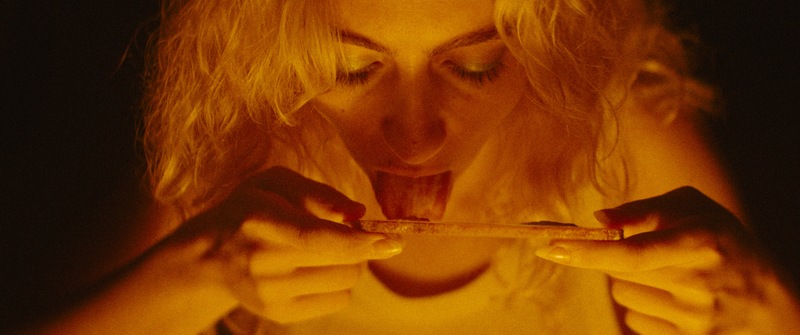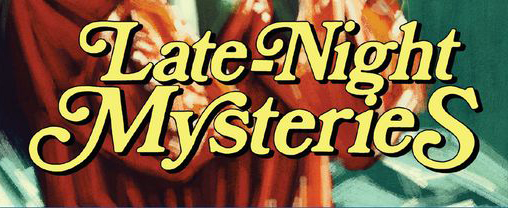
A Weird-Wave Trip Into Memory, Mother & Mutation
MOVIE REVIEW
She Loved Blossoms More (Agapouse ta louloudia perissotero)
–
Genre: Science Fiction, Comedy, Horror
Year Released: 2025
Runtime: 1h 26m
Director(s): Yannis Veslemes
Writer(s): Yannis Veslemes, Dimitris Emmanouilidis
Cast: Panos Papadopoulos, Julio Giorgos Katsis, Aris Balis, Sandra Sarafanova, Alexia Kaltsiki, Dominique Pinon
Where to Watch: releasing in select theaters + VOD/Digital Platforms on October 3, 2025
RAVING REVIEW: SHE LOVED BLOSSOMS MORE arrives as one of the most unusual films that I’ve seen lately, and that’s saying something. This feature resists easy categorization and pushes firmly into the terrain of the Greek “weirdwave.” Directed by Yannis Veslemes, the film fuses grief, science fiction, surreal horror, and an undercurrent of bleak comedy into a deliberately confounding story of three brothers attempting to undo the permanent. What begins as a strange family drama quickly morphs into something far less stable — a feverish meditation on memory and mourning where logic crumbles as easily as the flowers that line its title.
At its core, the narrative is straightforward: three brothers build a time-travel device in the hopes of resurrecting their mother. But Veslemes is less concerned with the mechanics of science fiction than with the emotions underlying it. The time machine, with its ramshackle construction, becomes a metaphor for the way grief itself distorts the passage of time. Past and present blur, leaving the brothers stranded in cycles of longing that the machine can never truly repair. It’s a setup that feels familiar, yet the execution turns it into something unsettlingly alien.
The performances work in tandem with the hallucinatory style. Panos Papadopoulos, Julio Giorgos Katsis, and Aris Balis play the brothers with a mixture of sincerity and absurdity. They are not refined protagonists but fractured figures, each carrying grief in ways that overlap and conflict. Their efforts often feel desperate, even comical, and the combination creates a tone where laughs curdle into unease. Dominique Pinon, no stranger to surreal cinema, adds another layer of peculiarity in a smaller but memorable role. Rather than anchoring the film in realism, the actors lean into the heightened tone, embracing awkward silences and exaggerated reactions that fit the dream logic surrounding them.
Visually, the film thrives on its oddities. Veslemes draws on practical effects, puppetry, and animatronics to create an environment that feels hand-crafted and grotesque. A flower might pulsate, a body might distort in ways that recall early Cronenberg, or with imperfect beauty. These images linger precisely because they are flawed — grounded in physical trickery that feels unstable, a mirror of the story’s emotional instability. The influence of giallo lighting is also evident, though here it is filtered through a haze of surrealism.
The film’s use of body horror is particularly striking. The attempt to bring back the dead mother becomes not just a metaphor but an act of literal reassembly. The brothers’ efforts are ridiculously comic at times, but beneath the surface lies the terror of tampering with what should remain untouchable. Veslemes never allows the audience the comfort of a clean resurrection story; instead, he makes viewers sit with the awkwardness, the failures, and the escalating absurdity.
It would be unfair to reduce SHE LOVED BLOSSOMS MORE to style without substance. Beneath its surreal surface lies a sincere exploration of loss. The absurdist humor, the body horror, the experimental visuals — all serve the larger question of how grief distorts families and warps love into obsession. By leaning into excess, the film conveys what can’t be spoken directly: the way mourning prompts people to act irrationally, desperately, and at times grotesquely. In that sense, the film achieves something rare. It doesn’t just tell a story of grief; it makes grief feel uncanny.
Veslemes’ work also situates itself firmly within the Greek weirdwave tradition — a lineage that includes filmmakers like Yorgos Lanthimos and Athina Rachel Tsangari. While Lanthimos often explores dystopian social structures and Tsangari examines intimacy refracted through absurdity, Veslemes leans into sensory disorientation. He embraces dreamlike visuals and distorted bodies, positioning grief as a surreal contagion. It’s not the most accessible path, but it’s undeniably distinctive, giving the film a singular voice.
Even with its imperfections, SHE LOVED BLOSSOMS MORE makes an impression that you won’t soon forget. It isn’t a film designed for consensus; it will divide audiences. Some will find it pretentious, others will find it revelatory, but few will dismiss it as forgettable. For those who connect with it, it offers a rare experience: one that transforms grief into a hallucinatory landscape, filled with moments of grotesque beauty and unsettling humor.
By its end, the film does not resolve grief so much as leave it suspended, still blooming, rotting. In that irresolution lies its most truth — that love and loss remain tangled, that memory resists closure, and that trying to control either leads only to more distortion. SHE LOVED BLOSSOMS MORE may not be easy to watch, but it captures the unease of mourning in a way that feels uniquely its own.
Please visit https://linktr.ee/overlyhonestr for more reviews.
You can follow me on Letterboxd, Instagram, Twitter, and YouTube. My social media accounts can also be found on most platforms by searching for 'Overly Honest Reviews'.
I’m always happy to hear from my readers; please don't hesitate to say hello or send me any questions about movies.
[photo courtesy of DARK SKY FILMS, YELLOW VEIL PICTURES]
DISCLAIMER:
At Overly Honest Movie Reviews, we value honesty and transparency. Occasionally, we receive complimentary items for review, including DVDs, Blu-rays, CDs, Vinyl Records, Books, and more. We assure you that these arrangements do not influence our reviews, as we are committed to providing unbiased and sincere evaluations. We aim to help you make informed entertainment choices regardless of our relationship with distributors or producers.
Amazon Affiliate Links:
Additionally, this site contains Amazon affiliate links. If you purchase through these links, we may receive a commission. This affiliate arrangement does not affect our commitment to honest reviews and helps support our site. We appreciate your trust and support in navigating these links.



Average Rating